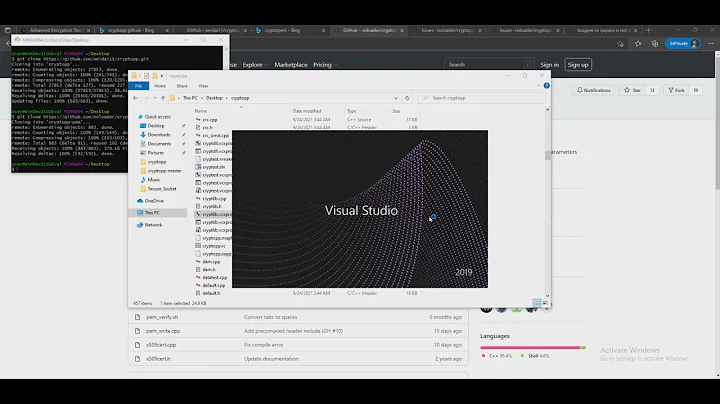Dependent DLL is not getting copied to the build output folder in Visual Studio
Solution 1
I found that if ProjectX referenced the abc.dll but didn't directly use any of the types DEFINED in abc.dll, then abc.dll would NOT be copied to the main output folder. (It would be copied to the ProjectX output folder, to make it extra-confusing.)
So, if you're not explicitly using any of the types from abc.dll anywhere in ProjectX, then put a dummy declaration somewhere in one of the files in ProjectX.
AbcDll.AnyClass dummy006; // this will be enough to cause the DLL to be copied
You don't need to do this for every class -- just once will be enough to make the DLL copy and everything work as expected.
Addendum: Note that this may work for debug mode, but NOT for release. See @nvirth's answer for details.
Solution 2
Just a sidenote to Overlord Zurg's answer.
I've added the dummy reference this way, and it worked in Debug mode:
public class DummyClass
{
private static void Dummy()
{
var dummy = typeof(AbcDll.AnyClass);
}
}
But in Release mode, the dependent dll still did not get copied.
This worked however:
public class DummyClass
{
private static void Dummy()
{
Action<Type> noop = _ => {};
var dummy = typeof(AbcDll.AnyClass);
noop(dummy);
}
}
This infomation actually costed me hours to figure out, so I thought I share it.
Solution 3
Yes, you'll need to set Copy Local to true. However, I'm pretty sure you'll also need to reference that assembly from the main project and set Copy Local to true as well - it doesn't just get copied from a dependent assembly.
You can get to the Copy Local property by clicking on the assembly under References and pressing F4.
Solution 4
It looks slick when you make it an assembly attribute
[AttributeUsage(AttributeTargets.Assembly)]
public class ForceAssemblyReference: Attribute
{
public ForceAssemblyReference(Type forcedType)
{
//not sure if these two lines are required since
//the type is passed to constructor as parameter,
//thus effectively being used
Action<Type> noop = _ => { };
noop(forcedType);
}
}
The usage will be:
[assembly: ForceAssemblyReference(typeof(AbcDll.AnyClass))]
Solution 5
Ran into this same issue. Background info: before building, I had added a new Project X to the solution. Project Y depended on Project X and Project A, B, C depended on Project Y.
Build errors were that Project A, B, C, Y, and X dlls could not be found.
Root cause was that newly created Project X targeted .NET 4.5 while the rest of the solution projects targeted .NET 4.5.1. Project X didn't build causing the rest of the Projects to not build either.
Make sure any newly added Projects target the same .NET version as the rest of the solution.
Related videos on Youtube
Comments
-
Brij over 2 years
I have a visual studio solution. I have many projects in the solution. There is one main project which acts as the start up and uses other projects. There is one project say "ProjectX". Its reference is added to main project. The ProjectX references another .NET dll (say abc.dll) that isn't part of the solution.
Now this abc.dll should be copied to bin/debug folder of main project, but it isn't getting copied there. Why is it not getting copied, any known reasons ?
-
 Dilshod about 11 yearsif you can't figure this out then copy it in your prebuild.
Dilshod about 11 yearsif you can't figure this out then copy it in your prebuild. -
NSGaga-mostly-inactive about 11 yearshow do you use your 'ProjectX' in the main project - what's the type of the project, target etc.
-
Gordon Tucker over 10 yearsI had the same issue and this answer solved my problem: stackoverflow.com/a/8213977/174469
-
 sirdank almost 8 yearsPossible duplicate of Msbuild doesn't copy references (dlls) if using project dependencies in solution
sirdank almost 8 yearsPossible duplicate of Msbuild doesn't copy references (dlls) if using project dependencies in solution -
oleksa almost 4 yearsthere is
RestoreProjectStylesolution available. The idea is to set<RestoreProjectStyle>PackageReference</RestoreProjectStyle>for each .Net Framework project in the solution.
-
-
Mike Perrenoud about 11 years@Brij, is the assembly referenced from the main project you want it in? As I stated, I'm pretty sure you need to reference from that project as well - dependent assemblies aren't copied over like that. If that were the case you wouldn't need to add the assemblies to all relevant projects when using NuGet.
-
Brij about 11 yearsI created a sample solution in Visual Studio. In that, the dependent dll is getting copied in the main project.
-
Mike Perrenoud about 11 years@Brij, what's the difference between the two solutions then? Are you referencing the outside assembly exactly the same way as in the other solution?
-
Brij about 11 yearsyes, the dll is at desktop and the project is referring that dll. And the project is referenced in main project.
-
Mike Perrenoud about 11 years@Brij, then that must mean the referenced project, from the main project, is setup differently in the working solution. Press
F4on the references project under the main project's References and see what the differences are between the two. -
Brij about 11 yearsNo difference other than the name and path.
-
Mike Perrenoud about 11 years
-
mcmillab almost 11 yearswhat was the conclusion here? It seems to me that you are right - dependent references are not copied even if CopyLocal is set to true - what is the logic behind that?
-
Mike Perrenoud almost 11 years@mcmillab, in short Visual Studio doesn't infer dependencies from other dependent projects. If project A references project B, project A will need to have all of project B's references. It works nicely when all project B needs is .NET assemblies, but if it's a 3rd party assembly you must add the reference to both projects.
-
 Jack Ukleja over 9 years@MichaelPerrenoud I don't think that's true. If you look at a detailed MSBuild output you will see calls to ResolveAssemblyReference which states it "includes second and nth-order dependencies". This also concurs with what I see in my bin folders (n-th dependencies get copied). The issue is there are some caveats about what is copied, mostly around GAC and indirect references (Add Reference is sometimes not enough)
Jack Ukleja over 9 years@MichaelPerrenoud I don't think that's true. If you look at a detailed MSBuild output you will see calls to ResolveAssemblyReference which states it "includes second and nth-order dependencies". This also concurs with what I see in my bin folders (n-th dependencies get copied). The issue is there are some caveats about what is copied, mostly around GAC and indirect references (Add Reference is sometimes not enough) -
 Mike K about 9 yearsThis seems like a hack. Adding the reference to the main project seems to be enough.
Mike K about 9 yearsThis seems like a hack. Adding the reference to the main project seems to be enough. -
Overlord Zurg about 9 yearsIt IS a hack, but as today's CodeProject news taught us, even compilers can be wrong!
-
Shawson about 9 yearsI've seen this myself- My model project references a 3rd party dll (A), which requires another 3rd party dll (B)- I reference model from my web project and publish, and B.dll doesn't appear causing a silent problem breaking part of the system. Very annoying.
-
Frank Liu almost 9 yearsI have seen the same thing. What is the conclusion?
-
Alex Fairchild almost 9 yearsAdding a reference in the main project did not work for me. Only adding the dummy reference got the compiler to copy the referenced dll.
-
Alfred Myers over 8 yearsAdding a reference to the main project wasn't enough. I had to create a dummy field in one of the classes to get the assembly copied over to the output directory. This approach is acceptable for test code, as is the case here, but I'd rather see a more robust solution for solving this issue for production code.
-
 Mohsen Afshin over 8 yearsHow crazy things can be. @OverlordZurg your solution worked as I had a reference to the dependent dll in my XAML (WPF) and it didn't copy the DLL to the main project until I add a simple dummy reference as you told ... Thanks anyway
Mohsen Afshin over 8 yearsHow crazy things can be. @OverlordZurg your solution worked as I had a reference to the dependent dll in my XAML (WPF) and it didn't copy the DLL to the main project until I add a simple dummy reference as you told ... Thanks anyway -
sotn over 8 yearsThis is the way I always use. I don't want to put a reference to every dependent project. It seems wrong to me..
-
redcurry over 8 years@MohsenAfshin I had the same issue---I was referencing a dependent DLL in XAML. Instead of declaring a dummy variable, however, I simply named the component I was using in XAML, and that was enough to cause its assembly to be copied.
-
redcurry over 8 yearsReferenced projects may be an older version of .NET. I'm able to reference a project built for .NET 4 by a project built for .NET 4.5.
-
tina Miller about 8 yearsMy current experience is that this will work except for 'copied' dependencies: project A.net references external C++ dlls as files which are 'copy always'. Project B.net references Project A. On build, B/Debug includes the C++ dlls. However, when I build Application X, which references Project B, the C++ dlls sometimes get copied (seems to be only if I do a Rebuild).
-
 jpmc26 over 7 years@MikeK Adding it to the main project (which doesn't actually directly depend on it) is an even bigger hack, imo. Then you have to manage it two places ("manage" as in upgrade or remove). With this hack, at least you get a nice compile time error reminding you to remove this hack when you remove the dependency, and you still only need to update it in one place.
jpmc26 over 7 years@MikeK Adding it to the main project (which doesn't actually directly depend on it) is an even bigger hack, imo. Then you have to manage it two places ("manage" as in upgrade or remove). With this hack, at least you get a nice compile time error reminding you to remove this hack when you remove the dependency, and you still only need to update it in one place. -
 jpmc26 over 7 yearsI'm pretty sure this is wrong. It doesn't need to infer dependencies, it just needs to copy output (from one project's bin to another's), which MSBuild does, at least normally.
jpmc26 over 7 yearsI'm pretty sure this is wrong. It doesn't need to infer dependencies, it just needs to copy output (from one project's bin to another's), which MSBuild does, at least normally. -
Yucel over 7 yearsin release mode, optimizer assume that "dummy" is not used so this line is unnecessary and should be removed. but when you use "dummy" in code, optimizer doesn't assume itis unnecessary.
-
Nathan over 7 yearsWas happening to me for a data layer library which only used extension methods. (Dapper) When the consumer of the library was built, it didn't detect the dependency correctly and didn't copy the dapper assembly, resulting in an ugly FileNotFound exception.
-
 Matthew Lock about 7 yearsthis doesn't work for me.AbcDll.AnyClass still isn't copied to other project
Matthew Lock about 7 yearsthis doesn't work for me.AbcDll.AnyClass still isn't copied to other project -
John-Philip almost 7 yearsThanks, you are right, MSBuild will not copy dll to output folder if it found them in the GAC.
-
Fls'Zen over 6 yearsCalling
GC.KeepAlive(typeof(SomeTypeInProblematicAssembly));at some point is sufficient for the dependency to be traced. -
 Ted about 6 years@MikePerrenoud I dont think thats true either (that you need to reference all references that Project B has). I have this issue now, where ProjectB is references from my MainProject and I get the error. I was hoping that VS understood that reference chain went like "ProjectA-->ProjectB-->ProjectC-->multiple DLLs including the 'cannot resolve'-DLL". But it fails. But, in another project, I have "ProjectOther-->ProjectB-->ProjectC-->..." but ProjectOther ALSO references ProjectC directly, and then manages to run as expected.
Ted about 6 years@MikePerrenoud I dont think thats true either (that you need to reference all references that Project B has). I have this issue now, where ProjectB is references from my MainProject and I get the error. I was hoping that VS understood that reference chain went like "ProjectA-->ProjectB-->ProjectC-->multiple DLLs including the 'cannot resolve'-DLL". But it fails. But, in another project, I have "ProjectOther-->ProjectB-->ProjectC-->..." but ProjectOther ALSO references ProjectC directly, and then manages to run as expected. -
Mike Perrenoud about 6 years@Ted I think this behavior is actually proven via NuGet. When you reference a NuGet package in ProjectA, then reference ProjectA assembly in ProjectB, you'll have to add that NuGet package to ProjectB for the build to work.
-
 Ted about 6 yearsNops, I dont think so. Im not sure what u mean with "proven via NuGet" or "NuGet package", but I have many many DLL-references in Project C that are not referenced in Project B or Project A in my chain, that looks like this: Project A ==> Project B ==> Project C. And it builds, but sometimes fails in runtime as described above.
Ted about 6 yearsNops, I dont think so. Im not sure what u mean with "proven via NuGet" or "NuGet package", but I have many many DLL-references in Project C that are not referenced in Project B or Project A in my chain, that looks like this: Project A ==> Project B ==> Project C. And it builds, but sometimes fails in runtime as described above. -
John Leidegren almost 6 yearsMake sure
AbcDll.AnyClassis used as a public field or property on a public class, then it will work. If you use it in a method body like this the compiler doesn't see it. It will delay load this assembly, not what you want to happen. -
 Mattkwish about 5 yearsI can't thank you enough... you saved me so much time. This was solution for me. It also exposed the root problem, the DLL I added as a reference matched a
Mattkwish about 5 yearsI can't thank you enough... you saved me so much time. This was solution for me. It also exposed the root problem, the DLL I added as a reference matched agitignorepattern, so when adding as a reference it did not add to the project. You MUST manually add the file to source control!!! -
 codemirror about 5 yearsCopy Loal was disabled, this helped stackoverflow.com/questions/15526491/…
codemirror about 5 yearsCopy Loal was disabled, this helped stackoverflow.com/questions/15526491/… -
 Matt Gregory about 5 yearsWpfAnimatedGif only adds attached properties to XAML elements, so wasn't being copied and there are no constructable objects in the library. This line in the window constructor works for me, though, both in Debug and Release:
Matt Gregory about 5 yearsWpfAnimatedGif only adds attached properties to XAML elements, so wasn't being copied and there are no constructable objects in the library. This line in the window constructor works for me, though, both in Debug and Release:string copyMePlease = WpfAnimatedGif.ImageBehavior.AutoStartProperty.Name; -
 Kevin Fichter almost 5 yearsThis worked for me, and I think this is the better answer. The dummy reference solution works, but it's a hack, whereas a post-build rule is a clean way to accomplish the same result.
Kevin Fichter almost 5 yearsThis worked for me, and I think this is the better answer. The dummy reference solution works, but it's a hack, whereas a post-build rule is a clean way to accomplish the same result. -
 J S almost 4 yearsThank you, but for me this only does something when I add the assembly attribute to the dependency (Project X), which already references the AbcDll.AnyClass. And then, it doesn't do more than normally, where it copies the AbcDll to the dependency's output directory. It still does not copy it to the main dependent project's output. And I cannot add the attribute to the dependent assembly unless I also add a reference to AbcDll. When I do that, AbcDll already gets copied without the attribute.
J S almost 4 yearsThank you, but for me this only does something when I add the assembly attribute to the dependency (Project X), which already references the AbcDll.AnyClass. And then, it doesn't do more than normally, where it copies the AbcDll to the dependency's output directory. It still does not copy it to the main dependent project's output. And I cannot add the attribute to the dependent assembly unless I also add a reference to AbcDll. When I do that, AbcDll already gets copied without the attribute. -
sigod almost 4 yearsTo put it simply: your project must reference dependencies of its dependencies. Which I find completely nonsensible.
-
Noman_1 almost 4 yearsActually I restarted the whole PC on my way of testing things but it worked for me
-
SomeCode.NET over 3 yearsI'm having the same problem with SDK project .NET5 , I tried this solution but unfortunately it didn't work for me, even after restart the PC :(









![Unable to copy a file from obj\Debug to bin\Debug [solved]](https://i.ytimg.com/vi/25T-faRD3bI/hq720.jpg?sqp=-oaymwEcCNAFEJQDSFXyq4qpAw4IARUAAIhCGAFwAcABBg==&rs=AOn4CLBvxLEPpnGGWeQbYtr9_Be5J6F8qw)
![[C# Trick] Cách nén toàn bộ dll vào một file thực thi duy nhất cho gọn, nhẹ, an toàn | Le Dung](https://i.ytimg.com/vi/YI64cofa9HA/hq720.jpg?sqp=-oaymwEcCNAFEJQDSFXyq4qpAw4IARUAAIhCGAFwAcABBg==&rs=AOn4CLBmlxHMDxnNikWhIh3YtsBNFaFQUQ)